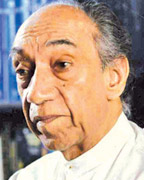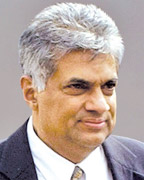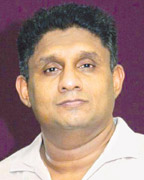Time opportune to rescue UNP
By Jaliya WIJEYEKOON
 |
| Dudley
Senanayake |
 |
| J.R.
Jayewardene |
 |
| Ranasinghe
Premadasa |
 |
| Ranil
Wickremesinghe |
 |
| Sajith
Premadasa |
The United National Party founded by its leader D.S. Senanayake in
1946, had been a formidable political force since its inception until
2004 in the political arena. The party was led by six leaders during the
past six decades and every one of them was confronted with different
conflicts, problems and challenges yet they managed to overcome them and
led the party to victory. However, the United National Party had its own
ups and downs in the distant past but it never bogged down in the
opposition for more than one parliamentary term prior to 1994.
The most charismatic and beloved leader of the party, four times
Prime Minister, Dudley Senanayake passed away in 1973 and the leadership
was taken over by Junius Richard Jayewardene the then leader of the
Opposition. He had to face a whole heap of challenges from the very
strong government headed by Sirimavo Bandaranaike and efficient but
arrogant ministers such as Felix Dias Bandaranaike, Dr. N.M. Perera,
Maithripala Senanayake, Pieter Kheunaman and some others.
JR, the well experienced and astute politician took up all challenges
valiantly along with only 16 members of the party and weathered all
political storms. He revolutionised the party mechanism from the lowest
level to the top with the support of his able set of lieutenants who
were under his wings. He delegated the party organisational activity and
monitored performance periodically and freely allowed them to establish
their political empires.
Jayewardene's farsighted visionary of local and international
politics correctly read the pulse of the people and made all the ground
work and formulated party policies to attract the general public to his
fold whilst being in opposition. Simultaneously, he extended his
unconditional support to the Sirima government on issues of national
importance.
However, when the UF government decided to extend its life span by
two years, J.R. intensified his anti-government campaign and mobilised
all forces backed by his able lieutenants such as Premadasa, Gemini
Renaissance, Lalith Athulathmudali, Dr. Anandatissa de Alwis, M.H.
Mohamed and Cyril Mathew and achieved an unprecedented five sixths
victory at the 1977 General Election.
JR's tenure of 12 years goes down in the annals of history as an
epochmaking period of socio economic development.
After J.R., Ranasinghe Premadasa took over the leadership of the
party and won the Presidential Election amidst severe oppression by JVP
in the South and LTTE in the North. He had to face an impeachment motion
initiated by some of his party stalwarts, but he managed to overcome all
obstacles and consolidate his position as well as the party membership
through his astute political wisdom and personal charisma.
However, the United National Party experienced a very unfortunate
period in its existence from 1991-1993 losing all its top rung leaders
such as Ranjan Wijeratne, Lalith Athulathmudali, and then incumbent
President Ranasinghe Premadasa and Gamini Dissanayake, at the subsequent
Presidential Election.
The party leadership was vested in Ranil Wickremesinghe in 1994. He
formed a government in 2001 with the support by a break away group of
Chandrika government headed by its General Secretary S.B. Dissanayake.
However, Wickremesinghe was not able to consolidate and continue due to
a number of reasons and the party was swept out of power in 2004.
Since then it had been a very poor performance by the UNP and a large
number of UNP stalwarts left the party and joined the UPFA government
claiming that the UNP will never return to power under the present
leadership. The last Presidential Election followed by the general
election further weakened the party when it lost almost all its
strongholds.
Though there were dramatic incidents and changes in the party during
the last two years, leader Ranil Wickremesinghe remained the leader
despite severe criticism by the membership.
It is the general belief of the grassroots level membership that the
erosion of the party is mainly due to the internal conflicts of the top
runners of the party. It is quite evident that the party is divided into
two groups, Ranil faction and Sajith faction which is not healthy for a
democratic political party.
2012 Provincial Council Election
When elections for three Provincial Councils were announced the UNP
sitting members were virtually in the political wilderness. It was the
deputy leader of the party Sajith Premadasa who encouraged the
candidates and spearheaded the entire political campaign during the run
up to election. Sajith while being deeply committed to his Sasunata
Aruna devoted full time to the election. He visited every nook and
corner of all three provinces and encouraged the grassroots level
membership to come forward. The standing ovation he received from the
rural masses clearly indicates his popularity among the people. The UNP
candidates were equally treated by Sajith Premadasa and everybody should
be thankful to him for his tremendous efforts to ensure party victory.
The general belief in most of the areas, specially in Sabaragamuwa
Province is that the UNP wouldn't have achieved even what they got if
not for the personal efforts of Deputy Leader Sajith Premadasa. He was
virtually in an out of Sabaragamuwa Province every other day during the
run up to the election addressing rallies, giving guidelines to
candidates and encouraging the membership.
However, the elections for three Provinces are over and now it is
time for all UNP leaders to sit down and think twice as to how they
should march forward as a United Party shedding petty differences and
without pointing the finger at one another for shortcomings or lapses.
Party consolidation is of paramount importance in achieving victory
in a future election. Internal conflicts, problems, disagreements,
differences of opinion and misunderstandings are common features in any
democratic political party, specially when it remains in the Opposition
for a very long time. It is for the leadership to have pragmatic
approach towards the issues and take sensible decisions which may not
further jeopardise the party membership.
It is quite evident that the grassroot level membership is getting
disintegrated in certain areas of the country and some are in a quandary
as to what they should do with on going conflicts in the party. It has
been proved with the last election results that some people have
deserted the grand old party owing to the constant problems among the
top leaders. Anyway it is still not too late for the incumbent leader
Ranil Wickremesinghe to evolve a viable mechanism to woo the support of
the disgruntled factions of the party.
Grassroots level membership is already fed up with the continuing
defeats of the party during the last number of years and unless concrete
steps are taken immediately to re-unite all the stakeholders, a victory
at a future election will be only a mirage!
|


